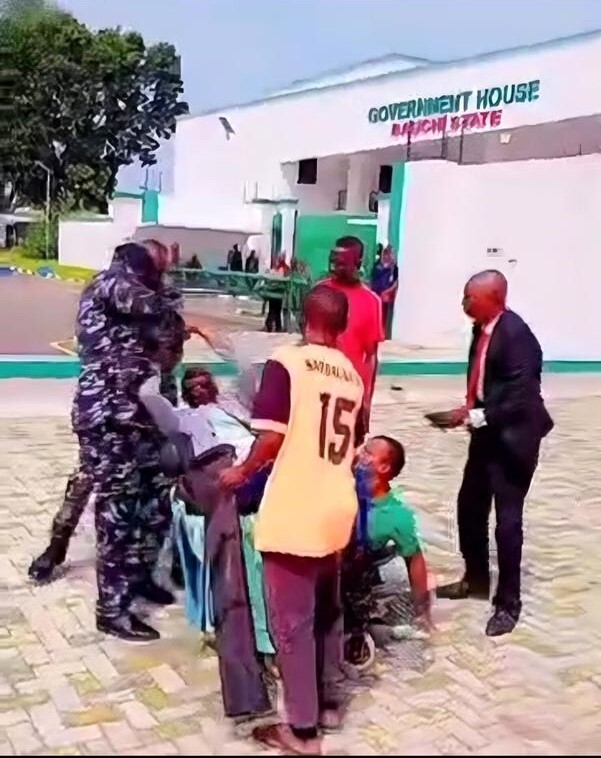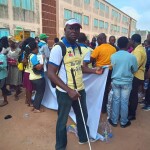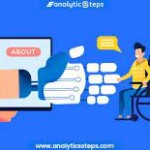At his wits’ end, a disability entrepreneur took his grievance to the government that shattered his hope. Then state agents battered him some more
Gideon Oladimeji
Hamzat Waziri has never lucked into most things he deserves as a citizen, no matter how much he tries. August 1 presented another opportunity to take his chances . And he made efforts to seek audience with his state government—for the first time.
The outermost layer of security he ran into at the Bauchi State House didn’t look like what they claim they are.
“I greeted them, said hello, but they didn’t respond,” he told ER.
That meant nothing to him. Since he returned from the University of Sussex in January, many have snubbed him during his loneliest moments: JONAPWD, his cluster, his colleagues in government. And even the National Commission for Persons with Disabilities (NCPWD). He flipped out his phone, and started recording himself and the 10 men he led there. The placards he stuck around his wheelchair screamed ‘Equal Opportunities for All’, among other slogans. Idris Lago, Yakubu, Hussain, and seven others also unfurled their NYSC certificates, and waved the documents over their heads. Hamzat proclaimed Section 40 of the Nigerian Constitution while recording.
Seconds later, three policemen, one of them identified as A.S. Ashira, rushed at him, and grabbed his phone. He held on to it. An officer then wrung him backward. Hamzat’s wheelchair pivoted on its rear wheels, jacking up his legs, and the front wheels nosed up right away. The officers’ goal was clear: fish Hamzat’s out of his wheelchair, slam his spine bang on the interlocking floor, and the phone would be theirs. One of Hamzat’s men using a skateboard for mobility had to hold onto their leader’s flailing limbs. That somehow kept the wheelchair from keeling over—until the chief security officer intervened.
“They said I captured their faces in my video, and they wanted to take my phone,” he told ER on Day 2 of the #EndBadGovernance Protest. The main protest was going on in front of the emir’s palace in Bauchi. He said he came to the government house to express his grievance. The NCPWD boss James Lalu in an August 3 reaction to the police attack dismissed that grievance. Bauchi JONAPWD chairman Bulus also told ER he already warned all members to keep off for their safety, and wouldn’t understand why Hamzat took his to the governor.
But Hamzat has reason to grieve.
And if protesting had been his nature, he could have staged one in 2017. He won the overall award during his youth service then for his advocacy in accessibilities across the state. And the state promised him a job or a scholarship. He got neither. And nobody said anything about it.
Bauchi has adopted the Discrimination Act 2018 whose Section 28(1) states: A person with disability has the right to work on an equal basis with others and this includes the right to opportunity to gain a living by work freely chosen or accepted in a labour market and work environment that is open. Section 29 also provides for a 5 percent employment quota for the PWDs.
“It is all too clear that the employment opportunities for PWDs in Nigeria are far away from being fair and equal,” Hamzat said.
This inequality has always been a concern for him. In 2017 he founded the Initiative for the Liberalization of Physically Challenged Persons in Nigeria to advocate for equal opportunities for all.

Since nobody offered him a job, Hamzat decided to do something for himself. With a second-class honors in business administration from the INTI International University, Malaysia, and a parcel of land on lease for temporary use at the Bauchi Roundabout, he founded the Able and Capable Enterprise in 2017. Five of the ten graduates working for him are PWDs. They had all faced discrimination and rejection in the public and the private sectors over the years.
And when their startup launched, it took a while before people believed a bunch of wheelchair users could succeed in a car-wash business. Hamzat tided the company through the initial storm, and things stabilized.
“I was able to pay them more than the minimum wage then, for more than seven years,” he said. The enterprise became the pillar for no fewer than 20 persons Hamzat alone supports in his family. Idris also supported four dependents. It was probably a purple patch not just in Hamzat’s entrepreneurial journey, but also in his life. He later bagged a Chevening Scholarship for his masters in development studies in the UK. And over there, they offered him two jobs—an internship as accessibility officer, and another position at a convenience store. And he still managed to cap off his studies with merit.
But the good time slid into a nightmare when he returned to Nigeria early in the year. After roaming around for a job he would never get, Hamzat fell back on his business. Then the state ordered him to leave the business premises within 48 hours.
“They said I was constituting a nuisance there,” he said.
Other occupants of government land across the state also got the same order.
“Well, I am a son of a civil servant. I know how powerful the government can be. So I complied.” And the state’s urban renewal authorities later levelled up the place—to plant flowers.
Hamzat, however, made a video while Gov. Mohammed Bala’s bulldozer ploughed its ripper into the nearly decade-old business, pulverizing Hamzat’s only source of living.
Dripping with his pleas for mercy, the video went viral. But nothing came of it. Nobody from the state’s disability community under JONAPWD called him to sympathize or help. Bulus said Hamzat never told them. “I’m hearing this from you now,” he told ER in a telephone interview. “If he’d reported to us then, we could have followed him to meet the governor.” Bulus, though, admitted that PWDs meeting the governor is one hell of an effort.
Maybe Hamzat’s cluster and all the CSOs and rights groups issued no statement because they didn’t know, either.
That, to him, was not just apathy; it was a conspiracy of the rich.
“There’s a saying in my language: If a sword passes over your head, and falls on other people behind, you don’t give a damn,” he said, describing the attitude of the organizations of persons with disabilities in the state.
Hamzat and his men have been reeling in the pain the Bauchi government inflicted on them for eight months. No consideration or compensation whatsoever for him and his men it rendered jobless. He has tried in vain to get a job.
“I feel like I’m lost in a maze with no way out,” he told ER.
Idris, an A. T. Ali Polytechnic Bauchi graduate, recalled their past job hunting at the state’s ministry of higher education. “We once visited office of head of civil service where we gave them our applications, and demand that 5 percent employment opportunities for PWDs,” the accountancy HND holder said. Nothing happened then.
“All of us feel like we have hit a dead end now,” Hamzat said.
He was groping in this thick mist of disorientation when he led his army of five men with limited mobility, and five others to the government house.
“This is why I demand accountability from the government.”
But the disability commission executive secretary doesn’t feel the men’s pinch.
“It’s in our view that the protest is needless,” Lalu said in a double entendre of a press statement he issued on August 2.
Hamzat has always known Lalu—from back in the days when he sought the NCPWD help for inclusion of applicants with disabilities in a PTDF scholarship programme. Of more than 300 scholarships the Fund gave out that year, Hamzat recalled no single PWD benefitted.
“I understand Lalu is a politician defending his seat,” he said, reacting to the commission’s statement. “But we cannot die hungry while he’s full and we are languishing in poverty.” All Hamzat said he wanted is employment for his men.
His demand nearly earned him another disability in the hands of police.

Again, the video of the assault went viral: a wheelchair user in the stranglehold of three police officers right in front of a government house. The state’s JONAPWD appeared helpless now. Bulus said Hamzat should have waited for the #EndBadGovernance protest to blow itself out before launching his personal one—that the body will help him take it up with the state. “We are disabled people. We need help.”
But Lalu has described Hamzat’s grievance as needless. So Bulus should realize the PWDs are more helpless than he thinks.
In past interviews with ER, many of those that form the rump of Nigeria’s disability community feared their commissions and NGOs don’t care. The pattern of these organizations’ responses to violation of PWDs’ rights almost confirms the fear. It was a mediafest the last time a wheelchair user and son of a former governor tweeted his experience of discrimination at a KFC outlet in Lagos. The NCPWD and a host of OPDs screamed blue murder.
Hamzat knows he and his men stand no chance of snagging such attention. It’s a privilege. But he has vowed not to back down from protesting.
That’s his fundamental right. And he made it clear to Ashira and the two other police officers who muscled him down at the government house.
ER asked the governor’s media aide what the state plans to do about Hamzat’s underlying protest. Mukhtar Gidado didn’t respond.
The government may have considered sufficient its official response to the trending video. “We wish to categorically states … Gov. Bala Mohammed doesn’t condone any form of violence or misconduct by law enforcement agents attached to the government,” Gidado said.
“That’s just a political statement,” Hamzat told ER.
He’s on his Day 4 of participating in the general protest now.
The protest will end; his misery won’t. Except something gives.







